GRBusiness
Controversies Crippling FG’s Treasury Single Account Policy


By Adepegba Rogers
Just few months after the Transparency International (TI) Corruption Index opened a can of worms on how Nigeria has sunk deeper into corruption, despite Muhammadu Buhari’s anti-corruption crusade, Ms. Priti Patel, former Secretary of State for International Development, United Kingdom, has made another debilitating remark. She has called on investors to be wary of investing in Nigeria, under Buhari, with a stern warning that they “should know of the corrosive effect of corruption, as well as the lack of transparency and associated difficulties of doing business in certain countries”.
The camp of President Buhari has not taken this statement lightly. We will all agree that Nigerians can say all they want about Nigeria, but when ugly remarks come from the international community, this government always runs into panic mode. Defensively, the Senior Special Assistant to the President on Media and Publicity, Shehu Garba, urged investors to ignore Ms. Patel, saying her “wicked proposition is lacking in substance and devoid of merit in empirical evidence established by facts”. Garba, in a firefighting approach, trumpeted that the Buhari administration has put in place instruments that have “extraordinarily and unprecedentedly reduced corruption and corrupt practices.” One of these is the Treasury Single Account (TSA) , which has led to greater visibility and control of government funds by way of consolidating government resources in an account as against the past where such accounts are scattered. Bravo!
I personally was looking forward to a mention of the TSA. The Presidency has never failed to force the success of the TSA, alongside Whistle-blower policy and Bank Verification Number (BVN), down the throat of anyone who cares to listen. It is often brandished and chorused as one of this administration’s most remarkable achievement, since it came on board in 2015, so much so, it has become obvious that there is no other thing to brag about in terms of achievement.
Even though the policy was kickstarted by the immediate past president, Goodluck Jonathan, Buhari has completely owned it, following his directive for full implementation in September 2015. Every little occasion has become right to re-echo the gains of the TSA. And to be fair, in terms of cash management, Nigeria is in a much better position because of the TSA. It has saved Nigeria close to N9 trillion since it was enforced, and additionally, it saves the FG about N24 billion monthly. This is the cost previously incurred from running multiple accounts in the days before TSA. Also, over 20,000 bank accounts have been closed.
Despite these gains, what Nigeria has in operation appears to be a caricature of the original policy defined by World Bank. The TSA policy in Nigeria has been bedevilled by major controversies which reflect poorly on the government and may threaten its sustainability, even though it is being hyped as a major success.
The TSA policy recommends ‘SINGLENESS’ in collection of all government revenues, but till date, several leakages occur due to FG’s poor stance on the policy and lack of ownership. Some of the most corruption-infested parastatals in the country, particularly, the Nigerian Immigration Service (NIS) and Nigerian National Petroleum Corporation (NNPC) are frequent offenders who still find ways to divert funds outside of the treasury. Others include FRSC, INEC, Police Force and some Federal Universities. It will shock most Nigerians to note that, years after the supposed full implementation by Buhari, Nigeria’s foreign earnings are still not channelled through the TSA.
With this massive diversion of revenue in several government agencies, it came as no surprise that ex-President Goodluck Jonathan who exclaimed that ‘stealing is not corruption’, has come out to boast that Nigeria was better off under him.
“It is important to note that despite the many sensational stories, dramatic arrests, seizures and accusations, many of them false, since I left office, the fact remains that Nigeria has not made any improvement on TI Corruption Perception Index since 2014.
“In fact, the 2017 CPI released in 2018 by TI places Nigeria as number 148, a retrogression in which the nation went 12 place backward. In other words, Nigeria is more corrupt in 2017 than it was when I handed over to Buhari administration in 2015. Some people may be misled with smoke and mirrors but the TI Corruption Perception Index relies on unsentimental facts and figures,” Jonathan submitted in his new book, My Transition Hour.
Another major controversy rocking the TSA is the outstanding debt and burden of transaction cost. When the TSA was fully adopted in 2015, the government agreed to pay SystemSpecs (the owners of Remita), banks and other payment providers. Under this arrangement, the government had a contractual obligation to pay a charge of 1% to the cap of N5,000. It was an excellent deal for the government as similar payment systems in Nigeria and foreign countries range between 1.5% and 3%. About a year after this agreement was made, the government reneged, called for a refund of commission due to service providers and held on to their payments for over two years. The debt accrued shot up above N10 billion, yet the TSA continued to run while the service providers groaned under the unfair treatment of the government.
On 1 November 2018, without any warning or sensitisation of members of the public, who actually pay into the TSA, the FG suddenly transferred the transaction cost of TSA to payers using the Remita platform. Not only that, amidst the huge debt, Ahmed Idris, the Accountant-General of the Federation, claimed that the TSA in the past two years has been serviced by N16 billion.
“Within the last two years, the government spent almost N16 billion in this direction which ordinarily should be borne by those making payments. So, it is time for Nigerians to pay for the services that they receive, and the government will take whatever is due to it without necessarily incurring cost. In the old tariff regime, the Federal Government bore the charges on all transactions to the service providers on behalf of payers,” the AGF said.
No one has challenged the government with these questions: First, why has the government failed to pay service providers for the past two years? Second, where did the N16 billion quoted by the AGF, go in the past two years, if service providers have not been paid? Third, why should the citizens be forced to pay for a service that the federal government signed up for to collects its own revenue, without being informed?
Also, the FG continues to show an unequalled level of disregard for the indigenous companies. A Nigerian company, SystemSpecs was able to deploy Remita, even when other foreign software failed, and the TSA was to be suspended for another two years.
Nigeria has always been known to invest heavily in foreign technologies. According to the President of Institute of Software Practitioners of Nigeria (ISPON), Mr. Olorogun James Emadoye, GIFMIS at Office of the Accountant General of the Federation is powered by a software from Estonia; IPPIS at the OAGF is powered by a software from United States; ITAS at Federal Inland Revenue Service (FIRS) is powered by a software from Canada; Bank Verification Number (BVN) at Nigeria Interbank Settlement System (NIBSS) is powered by a software from Germany; RTGS at the Central Bank of Nigeria (CBN) is powered by a software from Sweden while most of the software in Nigeria banks are India, Jordan and others. The yearly capital flight as a result of preference for offshore software is estimated to have risen from N200 billion in 2012 to N400 billion. This covers the acquisition and maintenance of the software used in both the public and private sectors.
The government has not only botched the agreement with SystemSpecs, it has also not seen the need to recognise the success of indigenous technology in powering a policy of such strategic importance. If the TSA was run by a foreign service provider, the huge cost implications in terms of maintenance charges will be gladly shouldered, with contract terms highly upheld to keep the project running.
The existing presidential directive that SystemSpecs be paid all agreed percentage was stalemated for two years without implementation, and with commencement of new pricing regime, the company may be pressured into forgoing an accrued debt of over N10 billion.
Like Ms. Patel alleged, it is always a problem for Nigerian government to honour contractual obligations either for investors coming into the country or with Nigerian firms doing business in the country. As a matter of fact, when it comes to Ease of Business, Nigeria has paid more attention to foreigners, than Nigerians.
The government’s role in business does not only “demonstrates the risks of investment into Nigeria,” but the unimaginable plight of Nigerian-owned business dealing with the government. We must first learn to do business with ourselves, before we let foreign investors expose the rot in our system to the world.
Rogers writes from Ilorin
Finance
AISA Has Refunded The Fees Paid By Yahaya Bello To EFCC
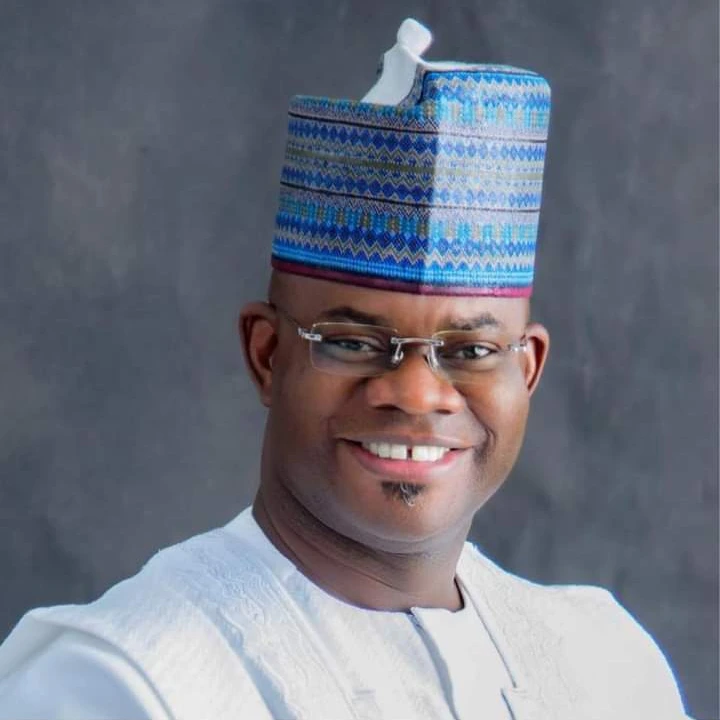

The Economic and Financial Crimes Commission (EFCC) says the American International School Abuja (AISA) has refunded the fees paid by the immediate past governor of Kogi state, Yahaya Bello, for his children attending the school.
In response to a letter addressed to the Lagos zonal commander of the EFCC, the school said $845,852 was paid in tuition “since the 7th of September 2021 to date”.
AISA said the sum to be refunded is $760,910 because it had deducted educational services already rendered.
“Please forward to us an official written request, with the authentic banking details of the EFCC, for the refund of the above-mentioned funds as previously indicated as part of your investigation into the alleged money laundering activities by the Bello family.
Since the 7th September 2021 to date, $845,852.84 (Eight Hundred and Forty-Five Thousand, Eight Hundred and Fifty Two US Dollars and eighty four cents) in tuition and other fees has been deposited into our Bank account.
We have calculated the net amount to be transferred and refunded to the State, after deducting the educational services rendered as $760,910.84. (Seven Hundred and Sixty Thousand, Nine Hundred and Ten US Dollars and Eighty Four cents).
No further additional fees are expected in respect of tuition as the students’ fees have now been settled until they graduate from ASIA.”
In a chat with The Cable, the spokesperson of the EFCC, Dele Oyewale, confirmed that the school has refunded the money.
‘’The money has been paid into public account,” Dele Oyewale was quoted as saying
Finance
Godwin Emefiele Disobeyed Direction Of Law With Intent To Harm The Public, He Printed ₦684.5M Using ₦18.9B Says EFCC in fresh charge


The Economic and Financial Crimes Commission has filed a fresh charge at the High Court of the Federal Capital Territory against the embattled former governor of the Central Bank of Nigeria, Godwin Emefiele.
EFCC in the charge accused Emefiele of approving the printing of N684,590,000 at the rate of N18.96 billion.
EFCC also alleged that Emefiele broke the law with intent to harm the public during his implementation of the naira swap policy of the administration of former President Muhammadu Buhari.
The anti-graft agency also accused Emefiele of unlawfully approving the withdrawal of N124.8 billion from the Consolidated Revenue Fund of the Federation.
EFCC’s top prosecutor, Rotimi Oyedepo, SAN revealed that Emefiele will be arraigned on a new four-count charge before Justice Hamza Muazu
Counts one to four of the charge, read,
“STATEMENT OF OFFENCE: Public Servant disobeying direction of law with intent to cause injury to the public contrary to and punishable under Section 123 of the Penal Code Law, Cap. 89 Laws of the Federation, 1990.
“PARTICULARS OF THE OFFENCE: That you GODWIN IFEANYI EMEFIELE between the 19th day of October 2022 and 5th March 2023 in Abuja, knowingly disobeyed the direction of Section 19 of the CBN Act, 2007, by approving the printing of N375,520,000.00 pieces of colour swapped N1, 000, at the total cost of N11,052, 068,062 without the recommendation of the Board of Central Bank and the strict approval of the President, Federal Republic of Nigeria which conduct of yours caused injury to the public and you thereby committed an offence.”
This and three other charges were stated against him. They read;
“COUNT 2: “That you, GODWIN IFEANYI EMEFIELE, between the 19th of October 2022 and 5th March 2023 in Abuja, knowingly disobeyed the direction of Section 19 of the Central Bank of Nigeria Act, 2007, by approving the printing of 172,000,000 pieces of colour swapped N500 (Five Hundred Naira) Notes, at the total cost of N4, 471,066,040 without the recommendation of the Board of Central Bank and the strict approval of the President, Federal Republic of Nigeria which conduct of yours caused injury to the public and you thereby committed an offence.
“COUNT 3: “That you GODWIN IFEANYI EMEFIELE between the 19th day of October 2022 and 5th March 2023 in Abuja, knowingly disobeyed the direction of Section 19 of the CBN Act, 2007, by approving the printing of 137,070,000 pieces of colour swapped N200 (Two Hundred Naira) Note, at the total cost of N3, 441, 005, 280 without the recommendation of the Board of Central Bank and the strict approval of the President, Federal Republic of Nigeria which conduct of yours caused injury to the public and you thereby committed an offence.”
“COUNT 4: “That you, GODWIN IFEANYI EMEFIELE, on or about the 7th day of October 2020, in Abuja, within the jurisdiction of this Honorable Court, knowingly disobeyed the direction of Section 80 of the Constitution of the Federal Republic of Nigeria, 1999 (As Amended), by approving the withdrawal of the total sum of N124, 860, 227, 865.16 from the Consolidated Revenue Fund of the Federation in a manner not prescribed by the National Assembly, which conduct of yours caused injury to the public and you thereby committed an offence.”
Transport
Federal Government To Launch Out 2700 CNG Buses, Tricycles Ahead Of First anniversary Of Tinubu’s Administration


The Presidency on Sunday said it was ready to launch about 2,700 CNG-powered buses and tricycles before May 29 when President Bola Tinubu turns one year in office.
“All is now ready for delivery of the first set of critical assets for deployment and launch of the CNG initiative ahead of the first anniversary of the Tinubu administration on May 29.”
It said the Federal Government is set to deliver 100 conversion workshops and 60 refuelling sites spread across 18 states before the end of 2024.
The Special Adviser to the President on Information and Strategy, Mr. Bayo Onanuga, revealed this in a statement he signed Sunday titled ‘Presidential CNG initiative set for rollout.’
“From the end of May, Nigeria will take some baby steps to join such nations that already have large fleets of CNG vehicles.




“All is now ready for delivery of the first set of critical assets for deployment and launch of the CNG initiative ahead of the first anniversary of the Tinubu administration on May 29.
“About 2,500 of the tricycles will be ready before May 29, 2024…working towards delivering 200 units before the first anniversary of the Tinubu administration,” said the Presidency.
He also said that over 600 buses are targeted for production in the first phase which will be accomplished in 2024.
In October 2023, about five months after the removal of the petrol subsidy, President Tinubu launched the Presidential CNG Initiative to deliver cheaper, safer and more climate-friendly energy.
The CNG Initiative was designed to deliver compressed natural gas, especially for mass transit.
The Federal Government earmarked N100bn (part of the N500bn palliative budget) to purchase 5500 CNG vehicles (buses and tricycles), 100 Electric buses and over 20,000 CNG conversion kits, with plans to develop CNG refilling stations and electric charging stations nationwide.
The FG had said the initiative would ease the burden of the increased pump price on the masses.More information added that the creation of a new plant on the Lagos-Ibadan Expressway that will assemble the tricycles while Brilliant EV will assemble electric vehicles when it receives the Semi Knocked Down components.




The Presidency explained further, “The SKD parts manufactured by the Chinese company LUOJIA in partnership with its local partner to support the consortium of local suppliers of CNG tricycles are set for shipment to Nigeria and expected to arrive early in May.
It is expected that before 2027, There’ll be a considerable wave of these buses and tricycles in use.
-



 News4 days ago
News4 days agoFuel Price Skyrockets To ₦1000 Per Litre In Some States As Scarcity Sets In
-

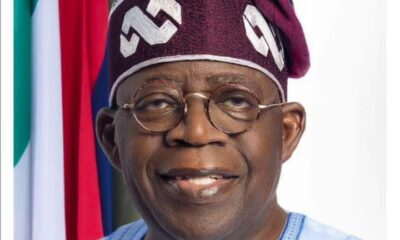

 Politics5 days ago
Politics5 days ago“Fuel Subsidy Removal Was A Necessary Action To Prevent Nigeria From Going Bankrupt” – President Tinubu
-

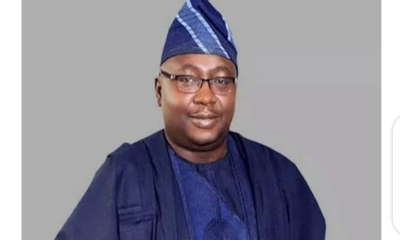

 News4 days ago
News4 days ago“There Would Be total Blackout For Three Months If Electricity Tariff Hike Is Not Implemented ” – Minister Of Power Warns
-

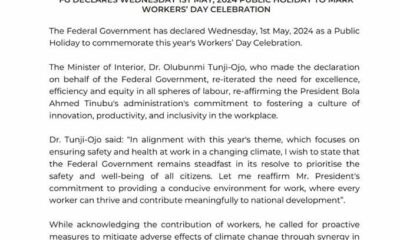

 News3 days ago
News3 days agoFG Declares May 1st Public Holiday To Mark Workers’ Day
-



 News2 days ago
News2 days agoAnambra State Government Arrests Man For Marrying Off His Underage Daughter
-



 News3 days ago
News3 days agoNigerians Seek Woman Who Spoke Out Eloquently Against Fuel Scarcity In Viral 1994 TV Clip
-

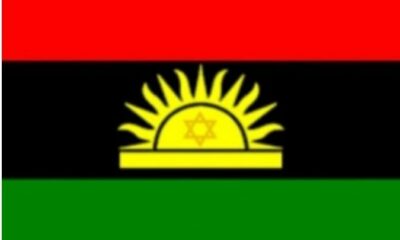

 News1 day ago
News1 day agoIPOB Declares May 30th As Sit-at-home Day Across The Southern East States To Honour Biafran Fallen Heroes
-

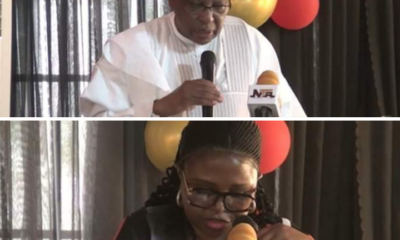

 Education7 hours ago
Education7 hours agoFederal Government Sets To Commence School-To-Work Scheme






